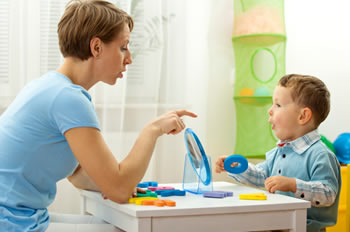 Young children with learning disabilities need many opportunities to practice the skills they are taught. Both parents and caregivers should plan activities to provide the positive practice needed for development. Here are some ideas for playing games using newly learned letters and words; finding numbers, letters and words in everyday items; other games that provide practice with numbers, letters, words and concepts; and using computer games and software to practice skills already learned. As you become familiar with these ideas to help your child become more aware of the ways that letters, words and numbers can be used, you will find many opportunities in daily life to emphasize their new skills.
Young children with learning disabilities need many opportunities to practice the skills they are taught. Both parents and caregivers should plan activities to provide the positive practice needed for development. Here are some ideas for playing games using newly learned letters and words; finding numbers, letters and words in everyday items; other games that provide practice with numbers, letters, words and concepts; and using computer games and software to practice skills already learned. As you become familiar with these ideas to help your child become more aware of the ways that letters, words and numbers can be used, you will find many opportunities in daily life to emphasize their new skills.
Play word and letter games that emphasize newly learned letters or words.
Be sure that new letters or words are used, along with those already known. Some ideas include:
- Concentration. Write pairs of numbers, letters or words on 3 x 5 cards.
- Bingo cards. Make simple cards with numbers, capital and/or lower case letters or words.
- Hangman. Play Hangman using newly learned words from stories, spelling lists, science books, or social studies materials that have been learned recently. For example, for practice on words read in a book on space, present _ _ _ _ _ _, which would be solved as “planet.”
- Rummy. Use 3 x 5 cards to make sets of three words to be practiced.
Take turns looking for numbers, letters, or words.
Try to emphasize those that are recently learned, along with some “old favorites” already learned. Depending upon setting and age, try some of the following:
- License plates. Watch for 3’s or 8’s on parked or moving cars.
- Billboards and signs. Find 7’s, G’s, or “SALE” in stores, along sidewalks, or beside highways.
- Magazines and newspapers. Point to, and perhaps highlight or circle, specific numbers, letters, or words.
- Computers and iPads. Suggest some word, letter or number to point to or find from something on the screen.
Play games that provide practice with numbers, letters, words, and concepts.
Choose games that require players to use a skill, along with some luck. Commercial or homemade games can be used.
- Simple board games. A path of colors, shapes, letters, or concepts and a spinner or dice move the pieces toward victory. Ask the child to name items along the path.
- Dominoes. Different sets of pieces may have colors, shapes, letters, words, or any pairs of matching concepts, such as items of clothing to match (e.g. a red hat, blue cap; and brown shorts, blue slacks) or word opposites (e.g. up, down; in, out; and back, front).
Use computer games and software to practice skills already learned.
Try to find a computer store that allows you to review a number of programs before you buy. Contact websites and companies that provide good descriptions of products and often include a demo disk or website experience that shows how the game is played. A few software packages to explore might be:
- Keyboarding skill development
- Reading skill development
- Mathematics skill development
- Written language skill development
Remember to keep your child’s attention span in mind. Try to stop before your child gets tired of the activity. Remember to take breaks. Allow your child to set the schedule. Make the activities positive and fun, as well as an opportunity to develop and learn.


